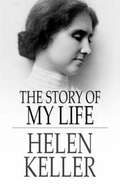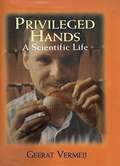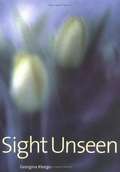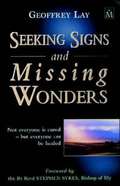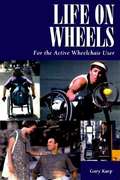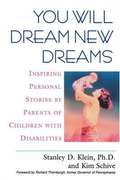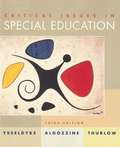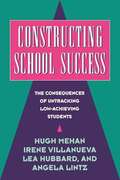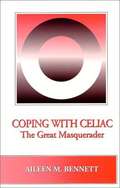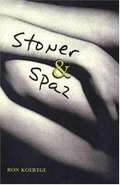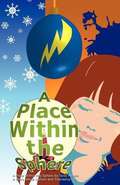- Table View
- List View
The Caterpillar's Question
by Piers Anthony Philip FarmerTappy was thirteen, blind, crippled and mute. Jack was hired to drive her across the country to a place where they were supposed to help her, but Jack wondered. They said she could speak if she wanted to badly enough, that the condition was hysterical. As they drove, he found himself liking the young girl and becoming more and more intrigued with her behavior. Why did she want to stop and walk around in the middle of nowhere. Perhaps Jack would regret his wanting to know when they both disappeared somewhere ... else?
Harnessing Thought
by Bruce JohnsonThis book tries to give a psychological insight into the skillful and thoughtful mind of the guide dog. How does the young dog acquire the knowledge and skills to be a safe, fluent and confident guide? Is the dog capable of taking conscious decisions about alternative courses of action, predicting what is likely to happen next in a particular situation and of remembering how to respond to a wide variety of objects, people and events? These are questions that take us to the very forefront of our understanding of animal learning, consciousness and thought.
Sight Unseen
by Georgina Kleege<P>This elegantly written book offers an unexpected and unprecidented accout of blindness and sight. Legally blind since the age of eleven, Georgina Kleege draws on her experiences to offer a detailed testimony of visual impairment - both her own view of the world and the world's view of the blind. "I hope to turn the reader's gaze outward, to say not only 'Here's what I see' but also "here's what you see,' to show what's both unique and universal," Kleege writes. <P>Kleege describes the negative social status of the blind, analyzes stereotypes of the blind hat have been perpetuated by movies, and discusses how blindness has been portrayed in literature. She vividly conveys the visual experience of someone with severely impaired sight and explains what she cannot (and how her inability to achieve eye contact - in a society that prizes that form of connection - has affected her). <P>Finally she tells of the various ways she reads, and the freedom she felt when she stopped concealing her blindness and acquired skills, such as reading braille, as part of a new blind identity.
Slackjaw
by Jim KnipfelIt wasn't until he was in his early twenties that doctors discovered that Jim Knipfel's nearsightedness was the result of an untreatable rare genetic eye disease known as retinitis pigmentosa, which, they said, would leave him blind within a few short years.
Seeking Signs and Missing Wonders
by Geoffrey LayJeoffrey Lay went blind, through a genetic defect, in his late twenties, and his wife Christine lost a daughter at the age of five months from serious cerebral palsy and other disabilities. Geoff is not only a Christian but a parish priest with a healing ministry.
Life On Wheels: For the Active Wheelchair User
by Gary KarpThis book offers an initial road map to the lifelong, complex, and fascinating road of the disability experience. This book is primarily a guidebook for those with a mobility disability, with practical information about how to adapt your home, choose a wheelchair, explore your sexuality, take care of your body. This book is designed to help people make their adjustments sooner and more completely by explaining how one adapts to disability, and by addressing misconceptions that only delay your ability to adapt. Throughout it I have tried to foster the principles of choice, of control, and of your right to pursue your interests and convictions. Life on Wheels is also an effort to explain that inclusion is an innate right for everyone and that people with disabilities are excluded for reasons not based on a balanced or realistic understanding of what is possible. It's time our world caught up with the reality, closed that gap, and allowed millions of people with disabilities to play their full role in society.
Medical, Psychosocial, and Vocational Aspects of Disability (First Edition)
by Martin G. BrodwinA textbook intended for professionals who assist disabled people
You Will Dream New Dreams: Inspiring Personal Stories by Parents of Children with Disabilities
by Stanley Klein Sharon SchieveStanley Klein, former editor of Exceptional Parent Magazine, brings a unique awareness about disability issues to this unusually forthright and positive book, aimed at parents of children with disabilities. Recognizing that parents are usually busy and overwhelmed, this book is composed of more than fifty short essays that can be read separately or in sequence. Parents write about diagnosis, treatment, education, and social issues, with poignancy and humor. Among the essays is the often quoted piece about "Going to Holland," which compares raising a disabled child to making a trip to an unexpected but ultimately rewarding destination.
Reading By Touch: Trials, Battles, and Discoveries
by Pamela LorimerHistory of reading for the blind.
Disability, Society, and the Individual
by Julie SmartThis is a textbook in a graduate rehabilitation counseling program. It is for a class called psycho-social aspects of disability
Critical Issues in Special Education, Third Edition
by Martha L. Thurlow Bob Algozzine James E. YsseldykeCritical Issues in Special Education is an analysis of important conceptual and practical issues that face special education professionals. Part One illustrates the background and status of special education through current analysis of fundamental guiding practices. Part Two focuses on key practices in special education services. Part Three provides an analysis of social, political, legal, and economic activity reflected in special education practice.
The Little Locksmith: A Memoir
by Katharine Butler HathawayFirst published in 1942 and reprinted here by the Feminist Press, this is the deeply honest memoir of Katharine Butler, who was disabled from childhood due to tuberculosis of the spine. Butler describes her bedridden childhood and her emergence as a teenager with a notably different-looking body. She writes openly of her longing for sexual love and her sense that it was forever denied to her because of her difference. Much of the book concerns the author's renovation of and hopes for a house in Castine on the coast of Maine, which she dreamed would become a house for children, artists, and lovers. Nancy Mairs' afterword provides fascinating information about the author's life.
Constructing School Success: The Consequences of Untracking Low Achieving Students
by Angela Lintz Lea Hubbard Irene Villanueva Hugh MehanBolstering the academic success of low achieving students and providing a more egalitarian classroom setting are two constant challenges to our schools. This book describes the process of "untracking", an educational reform effort that has prepared students from low income, linguistic and ethnic minority backgrounds for college. Untracking offers all students the same academically-demanding curriculum while varying the amount of institutional support they receive. This book is a highly readable account of a successful school reform effort. It provides systematic research results concerning the educational and social consequences of untracking previously low achieving students, and will be of great importance to researchers in educational and social psychology.
Mystery at Midnight (Cul-de-Sac Kids #24)
by Beverly LewisChildren's mystery, Grade 2-3, about a blind girl's missing guide dog. Easy chapter book.
Coping with Celiac: the Great Masquerader
by Aileen M. BennettThis is a book about sharing: shared stories, recipes, information about books that have been of help and general advice. This is a book for those who have Celiac Sprue, a disorder that makes the gluten that is in many foods a poison. This is easy to read and has lots of good resources.
Mended Wheels
by Ann Bell Judy SagalChristian romance set in Missouri in which one of the main characters is disabled.
I Use a Wheelchair
by AltheaJust because I have to use a wheelchair to get about, does not mean that I am stupid or silly. My legs may not wrk, but my brain works just as well as anyone else's of my age. it makes me mad when people ignore me and tal about me as if I wasn't there. I am there. me and my wheelchair.
Stoner and Spaz
by Ron KoertgeFOR SIXTEEN-YEAR-OLD BEN BANCROFT a kid with cerebral palsy, no parents, and an overprotective grandmother, happiness is, watching Bride of Frankenstein for the umpteenth time.
A Place Within the Sphere
by Tanis MorranEsmeralda Mrky sees herself as an outsider, cut off from other girls her age. Her friendship with Savannah Andreason, who has autism, helps her appreciate her own uniqueness and the power of her imagination. The book has some fantasy elements involving a magic Christmas ornament that transports Esmeralda into alternate realities.
